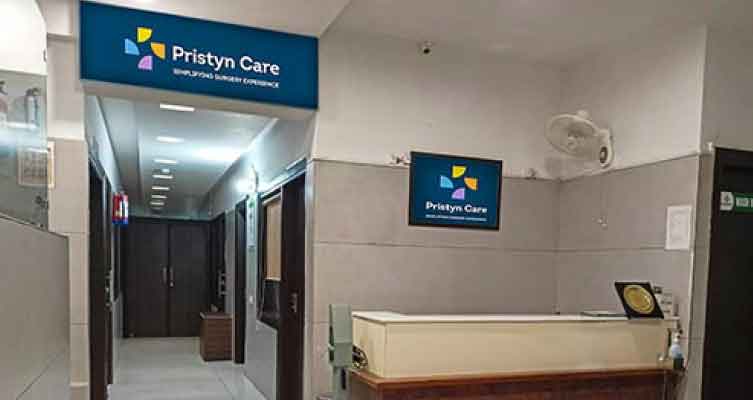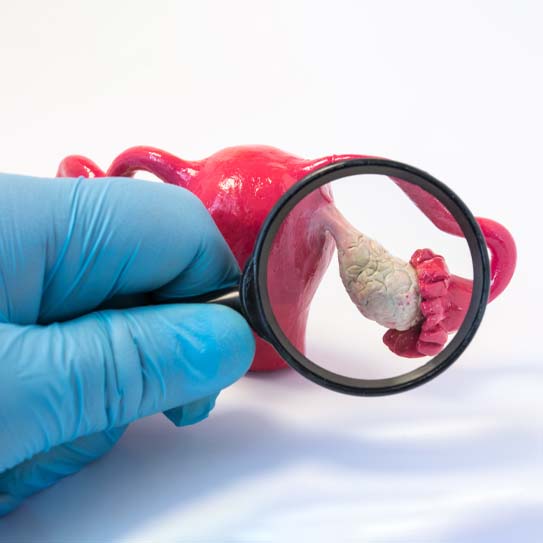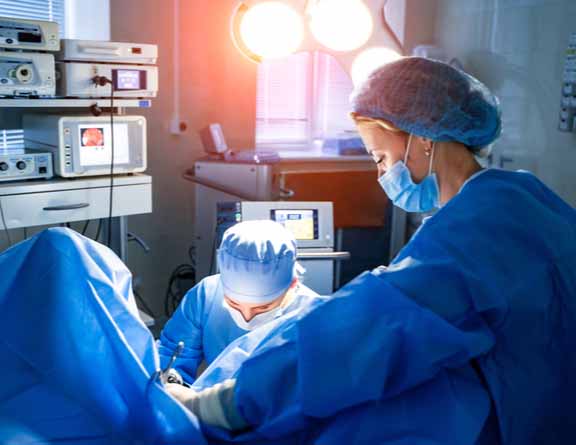
Guwahati
Laparoscopic Ovarian Cystectomy
Confidential Consultation
Expert Female Gynecologists
No-cost EMI



Ovarian cysts can be treated in multiple ways depending on their size, type, and severity. If the ovarian cyst is simple, that is, a follicular cyst which is lesser than 4 cm, it can be treated through birth control medications and lifestyle changes. These medications help stop ovulation and provide rest to the ovaries, which in turn, manages the condition.However, if the ovarian cyst is larger or pathological, that is, it is a dermoid cyst, endometriomas, cystadenomas, or hemorrhagic ovarian cyst, cystectomy surgery is suggested. Currently, laparoscopic ovarian cystectomy is the most advanced and minimally invasive surgical option to remove an ovarian cyst. It marks minimal blood loss, negligible scarring, and quick recovery.Pristyn Care is reputed to provide seamless and risk-free laparoscopic ovarian cyst removal at affordable prices in Guwahati. We are associated with multiple gynae clinics and super-specialty hospitals near you and offer various payment options including no-cost EMI. Call now and book your consultation.


Ovarian Cyst - Diagnosis and Surgery
Ovarian Cystectomy can be performed in two ways- advanced and conventional.
As the name suggests, it is performed using a laparoscope, that is, a tiny tube-like instrument with a camera and light on its end. First, the surgeon creates a tiny hole (main port) on the diseased site. Through this, they inject CO2 gas into the patient’s abdominal wall to lift it above the intestine and create better visibility. If needed, 1-2 more small ports may be created to insert necessary surgical instruments. Thereafter, a small camera and light (laparoscope) are passed through the main port to provide maximum visibility and improve the preciseness of the operation. Monitoring the site through the digital screen, the surgeon removes the cyst through the main port and closes it through a stapler or 1-2 stitches. The other smaller ports heal naturally.
Mostly, the patient can go home the same day and substantial recovery can be expected within 2-3 days.
As the name suggests, it is done through an open-cut incision on the diseased site. The surgeon then removes the troubling cyst and closes the incision through stitches. The method is usually recommended only in case of an exceptionally large, cancerous, or complicated ovarian cyst. It is comparatively more invasive, marks heavier blood loss, visible post-surgical scars, and a longer recovery period.
Certified Female Gynecologists. Quick & Rapid Recovery.
Our team consists of the top gynecologists in India with extensive experience in performing ovarian cyst surgery and ensuring the patient faces minimal discomfort in the process.
To help patients manage the expense of ovarian cyst treatment, we provide No-Cost EMI offers. By availing of these offers, patients can pay for their ovarian cyst surgery in convenient and affordable monthly installments.
Our expert Gynaecologist spend a lot of time with you to diagnose your condition. You are assisted in all pre-surgery medical diagnostics. We offer advanced laser and laparoscopic surgical treatment. Our procedures are USFDA approved.
We ensure 100% confidentiality of the patients throughout the treatment process. All the treatment details and documentation are kept secure, and no information, under any circumstance, is leaked to an outside party.
Laparoscopic ovarian cystectomy costs around Rs 40,000 to Rs. 70,000 in Guwahati. The exact price may vary on your choice of hospital, doctor’s fee, days of hospitalization, medication, and other medical and non-medical factors.
Pristyn Care gynecologists are some of the best and most reputed gynecologists in Guwahati. Our surgeons specialize in minimal access surgeries (MAS) and track excellent patient reviews for the past 10-15 years.
Call directly to get a list of our operating gyne surgeons in Guwahati or book a direct consultation.
Pristyn Care-associated hospitals are some of the most dependable and reputed hospitals for ovarian cyst surgery in Guwahati. This is because:
No. Doctors suggest you keep a 6-8 hour fast before the surgery. Else you could have anesthesia-related side-effects or complications. This is why we schedule your surgeries early in the morning after overnight fasting.
Ovarian cyst removal surgery is a slightly delicate procedure and may take anywhere between 1-3 hours. However, this time may also vary basis your individual health, co-morbidities, surgery method, doctor’s experience, etc.
Yes. Ovarian Cyst removal surgery falls under the medically necessary bracket of insurance and is hence covered by most insurance providers in India. However, the same may vary from policy to policy, case to case, or on the reason for the surgery undertaken. We suggest you call us directly for a more precise answer on your individual case and policy.
While recovery after open-cut ovarian cystectomy takes well over 15-20 days, substantial recovery can be expected within 3-5 days after laparoscopic ovarian cystectomy.
No. Ovarian cystectomy removes only the cyst and not the ovaries. Therefore, it does not affect a woman’s fertility. However, as the diseased site is slightly critical, we suggest you choose only a very well-experienced surgeon to rule out any avoidable surgical complications.
No. The surgery itself has no major or long-term side effects. However, yes, you may feel slightly bloated for a few days or experience little nausea, numbness, discomfort, or loss of appetite for the first few days of recovery. The same shall mellow down with your prescribed medications, good diet, and rest within 3-5 days.
Typically, one can resume their sexual life within 10 days post laparoscopic surgery. However, it may differ from person to person. We suggest you take enough rest and resume only after you feel fully recovered and healthy.
To detect the presence, severity, and course of treatment for ovarian cysts, you may be recommended the following tests:
Here is a general guideline to help you prepare for the surgery:
We suggest the following guidelines for a smooth recovery after ovarian cyst surgery:
Pristyn Care is one of the leading healthcare providers and associated with multiple gynae-clinics and super-specialty hospitals in Guwahati.
We take care of your end-to-end patient experience and provide some unique benefits. These include:
Booking an appointment with a Pristyn Care gynecologist in Simply call us directly or fill out our ‘Book my Appointment’ form. It would ask you just four basic questions such as ‘Your name’, ‘Contact’, ‘Disease name’, and ‘City’. Just fill them and click ‘submit’. Our medical coordinators will call you shortly and help you speak to a doctor of your choice.
Mausami Shirke
Recommends
I had an ovarian cyst, and I was worried about the treatment process. Pristyn Care's team assured me that the laparoscopic cystectomy was a safe and effective option. The surgery was successful, and I experienced minimal discomfort during recovery. I'm grateful for Pristyn Care's expertise in managing ovarian cysts.
.svg)
.svg)
.svg)